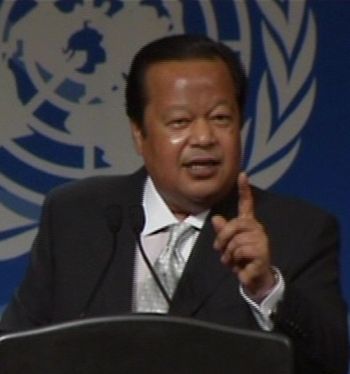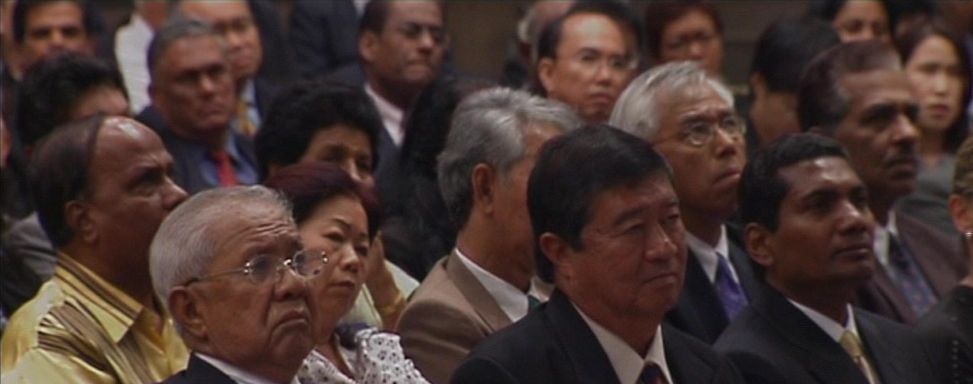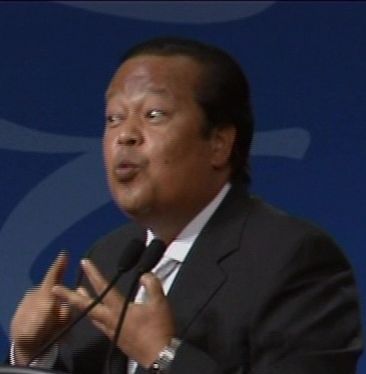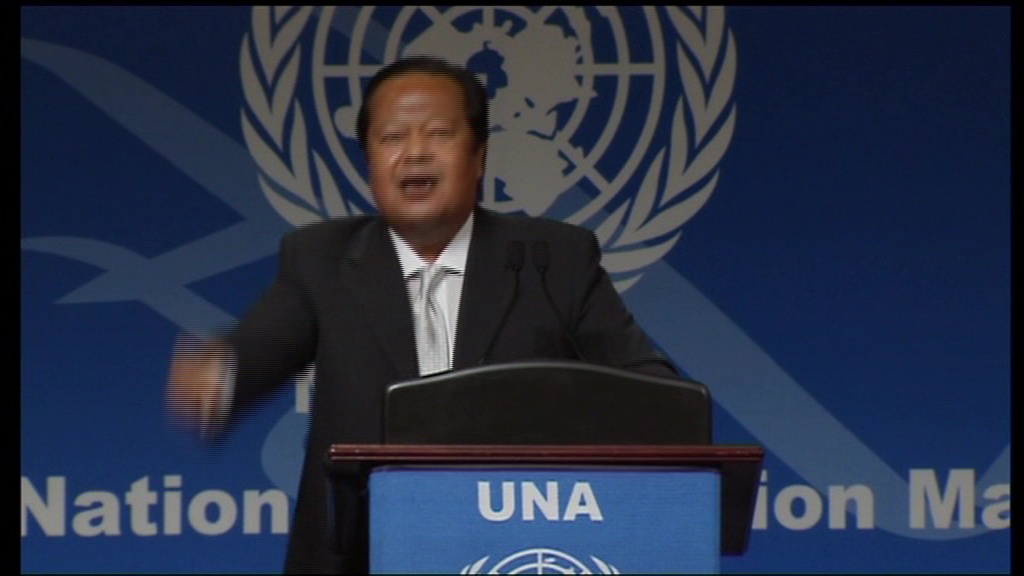
Prem Rawat: United Nations Association of Malaysia, 25th April 2005
Rawat's speeches were not written or prepared but they are certainly not unrehearsed. The speeches preceding his current one are the rehearsals and the speeches following evolve gradually using the same store of tales, premie gossip, clichés, life events, recent tv shows and stock phrases.
![]() Rawat began in restrained manner for him but. He says 'peace' 43 times in a 30 minute speech. Excessive, even for him. It was a short speech as I think he had another at the University of Malaya that day.
Rawat began in restrained manner for him but. He says 'peace' 43 times in a 30 minute speech. Excessive, even for him. It was a short speech as I think he had another at the University of Malaya that day.
All longterm premies (Rawat calls his followers premies) are involved in a conspiracy of silence whereby they do not talk about his former career as Guru Maharaj Ji. A smaller number are involved in actual conspiracies, for example those who joined various United Nations organisations to influence these NGOs to allow Rawat to use them to make him appear to be associated with the real UN. By 2006 Rawat had made many speeches to ordinary members of the public (though the audience was always minimum 95% his followers) but this is one of the most chaotic speeches I have heard him give. Linda Pascotto and Stephen Sordoni, TPRF directors and high status inner circle (inherited wealth) premies and conspirators sit in the front row.
Rawat says we have been given the gift of life but he doesn't mean by our parents. He says the fundamental needs of people, are that joy, that happiness, that peace, that fulfillment of the heart. He doesn't mean the joy, happiness and fulfillment as defined in dictionaries. He means an ineffable, invisible and undetectable 'peace' he claims he can reveal. Out real fundamental needs are air, water, food but knowing that does not provide happiness nor does Rawat's meditation.
- "This is not coming from a prepared speech. This is from the heart." It's actually from his mind, where else is all your information stored? Its also very similar to the speech he gave that day as the University of Malaya and the prior one and the next one.
- "I have never come across anything called the world" He can't come across something of which he is a tiny part, he is a frog in a well who cannot see the ocean
- He retells his parrots fable but the premies are the parrots, they mindlessly repeat Rawat's spiel without ever experiencing the 'peace' he is selling, they hadn't been taught to recognise a scammer with a pitch too good to be true.
- "We lose our health to make money, and then we spend all that money that we made to gain back our health" Rawat has always been obese and unhealthy
- "Peace is as important as breathing air, as eating food, as having shelter, because it is the fundamental necessity of every heart on the face of this earth" Only a tiny number of people even believe this 'peace' and this 'heart' which he talks about exist. Therefore it is of no importance and Rawat continues his abuse of the meaning of 'peace', 'heart' and 'fundamental.' His speech is a series of mind-farts
- Rawat knows nothing about Socrates except he is quoted as saying "Know thy self." Socrates did not have a vision of peace and joy, quite the opposite
- How well did the speech go? I think this random shot of the audience says it all.

Prem Rawat: United Nations Association of Malaysia, 25th April 2005
Good evening, ladies and gentlemen. On behalf of the United Nations Association of Malaysia, the UN Development Project and the Prem Rawat Foundation, I extend a very warm welcome to all of you to this afternoon's talk.
Thank you. His Excellency, Tengku Tansri Dato Sri Dr. Ahmad Ratauddin, President of the United Nations Association of Malaysia, Dr. Leet, Representative of the United Nations Development Programme, Your Excellencies, Cabinet Ministers, Ambassadors, High Commissioners, and distinguished guests, ladies and gentlemen.

What I would like to talk to you about this evening is really very simple. This is not coming from a prepared speech. This is from the heart. And I would like to begin with a story. I know there are very distinguished guests here. Telling a story seems to be so inappropriate. But maybe it is very appropriate.
The story is about a person who loved to raise parrots. And so one day he decided that he really wanted to raise some very, very special parrots. So he went and he bought three eggs, hatched them, and started raising them. Now by the way, you may not have heard this story before because this story came to me one night in my dream when I was sleeping. Many times I find myself speaking to large audiences in my dreams too. And he tried to teach these parrots everything he could. He taught them about Newton's physics laws. He taught them about formulas. He played music for them. And by the time these parrots got old, boy, they could recite incredible formulas. They could quote from incredible scriptures. They could say amazing things. They could quack in complete tune the entire symphony of Beethoven. Well, one day, unfortunately, the man died. And the parrots got left. The relatives came, saw the parrots in the cage, and decided who was going to take care of them. Maybe the best thing is to release them. So he did. Now parents, these parents had never learned how to fly. So he let them out on the tree right outside the window and they crawled up on the branches and they sat there looking around. This was a new experience for them. To their great surprise, they saw another parrot sitting on a branch higher up. And they struck up a conversation. And the conversation went something like, look at all the things we know. We know this and we know that and we can recite this and we know this formula and we know that formula. And all the things that they were saying, they were really trying to impress this other parrot. And the parrot was getting very, very impressed. Out of the corner of his eye, he saw a cat. And this cat had definitely detected the parrots and was starting to come up the tree. So this other parrot looked at the three parrots and said, do you know how to fly? They said, of course we know how to fly. We know everything about flight there is. Pressure is created at the bottom of the wing. Low pressure is created at the top of the wing. And because of this, we can fly. He said, no, no, no, no, I'm not talking about the formula bit. I'm talking about do you really know how to fly? They said, but we know so much. We know so much. We know all these incredible formulas. We know these symphonies. We know so much. Surely, if we don't know one thing, what difference could it make? And as he saw the cat coming closer and closer, he took his wings and he took flight. And he said, good luck. Because that one thing you don't know, that one thing you don't know, you really need to know. And because you don't know that one thing, all that you know isn't going to do you any good.
I think it's a cute story. What is the significance of this story? The significance of this story is that all that we have accomplished in this world, and it's a lot, but if we haven't accomplished that one thing that is so fundamental to us, then all that we have accomplished isn't going to help us. We look at wars, and we detest wars. And we wonder why people have to fight, why there has to be bloodshed. And we come up with incredible explanations, and we talk about societies, and we indeed talk about nations, but we don't talk about the individual people. When the war rages on, within the minds of individuals, this is the reflection that you see. An analogy would be, you're watching a movie on the screen, and what you see you don't like. It's terrible. So you go and you say, let me change the screen. You can change the screen a million times. It's not going to help, because it is that piece of film in that projector that is projecting this image that you either like or do not like. War is representative of what takes place in the vacuum of the fundamental fulfillment that each individual needs to feel.
Peace is not a luxury. Peace is not a luxury. Peace is as important as breathing air, as eating food, as having shelter, because it is the fundamental necessity of every heart on the face of this earth. We tell people what they should like and what they should not like, but we forget to tell them, listen to your necessity as well. What is it that you, you as a human being on the face of this earth, want from the depths of your being? I was thinking something. A lot of times, I say to people, you know, I've traveled the world, and yes, I have traveled the world many times over, but you know what the amazing thing is? I have never come across anything called the world, and so people sometimes look at me like, how can that be? Well, I have an analogy for you.

It just hit me the other day. I have a family, and yes, to anyone else, I can say this is my family. Very generic name, family. This is my family, but when I'm at home, there is no such thing as family. Each one of my children is very, very different. How I treat them, how I relate to them, what I say to them, what they say to me, what my relationship is, is very individual to each one of them. There is no one unit. For me, for you, who is not part of my family, I can point to this, mass, a group of people, and say this is my family, but when it comes to each one, and my reaction, and my interaction with them, it is distinctly very individual. We have forgotten the individuality of a person, that what that person needs, besides all the other things that the world is ready to hand out, to dish out to them, is also peace. How much is spent on war, and how much is spent on peace, I don't think even a half a percent is spent on peace, when billions, and billions, and billions, and billions are spent on preparation, just preparation of war. I am not speaking to you from any authority. I'm speaking to you as a human being who shares this earth, who lives on this earth, like you do, and a person like you, who holds peace very close to his heart. Long time ago, like you've already heard, I started speaking to people, and of all the things that they could be offered, peace was the one they wanted the most. I saw this when I was young. Real peace was the dearest thing, dearest thing, that could be offered to a person. Of all the accomplishments that people had, because when I was that young, everybody I met had much more than I did. There were doctors, there were engineers, there were pilots, there were all these people from all these different walks of life, and when peace was mentioned, this put a smile on their face. Peace was the most sweetest, most beautiful idea.
Long time ago, a Greek philosopher, now you know the name, said, know thy self. Long time ago, a Chinese philosopher said, to know your friends is good intelligence, but to know yourself is good wisdom. True wisdom, true wisdom, comes when we can listen to our fundamental needs, the needs that are begging us for that freedom, begging us for that peace, again and again and again. Peace is not, by any stretch of the imagination, a new concept. As long as there have been wars, there has been a voice that has called out again and again and again and again for peace, real peace, true peace. Peace as experienced by every individual, that is real peace. To hand a package to someone and say, I have given this group of people. It isn't a question of group of people. When it comes to thirst in a desert, everyone has to taste the water individually. Knowing thyself, knowing thyself is understanding that very thirst that pulses in the heart of every person. So yes, there are many accomplishments and amongst those accomplishments, there has to be one more.

No house is built of just one thing. It takes many things to build a house, to compose that structure. And yes, there are many needs and the world has many needs. But there is one thing that every house has to have and that one thing is the foundation. It is least looked at, it isn't ever pretty, but when the earthquake comes, our attention goes to the foundation and we pray that the foundation is strong. Peace, my friends, is the foundation of the people of this age and day. It has not been set. It has not been looked at. We have looked. We have looked and certainly taken advantage of all the technologies of going to the moon. You know, every time it comes, every time it comes to those issues that are so dear to us, our finger goes out. We look in fascination and we say, I want to go there. People say, where is God? And we say, there. And yet, all of this to explore the inner self. To explore the inner self of what goes on here. Because this, this is the place where you will find your peace. This is the place where you will find that reality, reality that is with you wherever you go.
What has become in our society? We lose our health to make money, and then we spend all that money that we made to gain back our health. It is truly a vicious little circle that runs around and around and around and around. This is nothing new. The viciousness of the circle is not new, nor is the circle new. It has been there forever. We have had a misunderstanding that through technology and through innovation, we will seek a way out of this puzzle.
I am not against technology. I love technology. Believe me, button pushing, I am just as happy pushing buttons all day long. Look at it. How many buttons do we push? Push, push, push, push, push, push. And the button of the heart, the button of the peace, never gets pushed. Because there is no time in the agenda to acknowledge your existence. There is no time in the agenda to acknowledge that you are alive, too, and that you have that need. If we want peace in this world, then the peace will have to begin with every individual. That is not a problem. People might say, well, that's a real problem, because how are we going to do that? That's not the problem. That is just the way it is. That is just the way it is. If you want to feed people, you cannot put food on a pole 200 feet high and say, here it is, can't you see it? No, food has to be placed where they can eat it, where they can have it, where they can feel it, where they can satisfy their hunger. I have come with no magic solutions. I have come with no magic wands to say, okay, let's wave this wand. I do not come here with another formula for peace. I am merely here to acknowledge the very things that we have always known, that the peace begins with every individual and peace begins with the recognition of this heart, of this life, of this breath, of this existence. We have always known that. It is time to stop hiding from our realities and to open the gates for all people around the world to fulfill their fundamental wish for peace. That is the time. It is our time. It is no one else's time. This is our time.


We are in the midst of writing the history We read history, but do not realize that we also make history. We get fascinated by history, but we forget that right now of all that we do, we write the history. What do you want in the history books? What do you want in the history books of tomorrow? Do you want people to read about the existence of peace, or do you want another repeated chapter of war and wars? Because remember one thing, if human beings can start wars, they sure can make peace. It is the reverse side of that coin and it is us. There is no them that will bring peace to us. Peace is not going to come in a package. Peace is not going to come in a box. Peace is not going to come as a rain from the heavens. Because the possibility of peace has already been given to every single living person on the face of this earth. What has to happen is they have to discover it. This is a process of discovery. Discover within you the need for peace and let create an environment in which people can feel free to feel that peace in their lives. Be in that joy yourself as to allow others to be in the joy of this gift of life that we all have been given. If you want to know what is wrong with wars, it is very simple. It is unreversible. You can take a life, but you can never give it back. That is no good. There is one gift that we have been given and that gift has to be protected by all of us. Never to be taken, but protected and given the element to thrive. Like you do when you sow a seed of a flower that is dear to you. You sow the seed, you water it, you give it the space to thrive to let it do its thing, to magically unfold, to bring on the colors. Have you ever wondered from brown earth a rose draws red colors? Isn't that amazing? A cow eats green grass, makes white milk. All of these are the existences. Look around you. Look around you as the sun rises and look around you as the sun sets. Look at you as the time envelops you and you pass into that time. Look at you as you look at the world. Look at this world, too. You are a world unto yourself. Every single person is a world unto themselves.

And yes, technology can take care of a lot of basic needs of people, but technology cannot take care of the fundamental needs of people. The fundamental need being that happiness. The fundamental need being that joy. The fundamental need being the fulfillment of this heart. So yes, peace is possible. It is very, very possible. And it begins with each one of us. A journey of a thousand miles begins with the first step. And if you can take that first step in your life, you can also complete the journey of a thousand miles. It is possible, but it will happen with one step at a time. And that one step begins with you. So once again, I'd like to thank you for listening to what I had to say. Maybe you found it too overly simple, not complicated enough. Well, what I have to say is really simple, because at the end of the day, we are all very simple. At the end of the day, when we lie in the bed, we're not an engineer, and we're not a pilot, and we're none of those things that we play our games with. We are who we are. And if you don't know who you are, then you don't know who's lying in that bed. And one day, by the of God, you keep getting up from that bed, and that's a good thing. One day you're going to go and lie on that bed. You're not going to get up. And that'll be for a very, very long time.
So you better know who goes to bed every night, who wakes up from that bed every morning. And when you look at that mirror, don't just look at it for shaving. There is a face there that has been there for all your life. And you know what? It wants to say something to you. And what it has to say to you is very beautiful. It's not scary. It's very, very beautiful, and it's very, very simple. That you've been given the gift of life, that you have this existence. Fulfill it. Like that rose fulfills its destiny. In its blooming, it fulfills itself. You too. Every person, citizen of this earth fulfill your destiny. Fulfill your quest. Fulfill your thirst. And be happy. Be content. So like I said, if it sounds overly simplistic, it is very, very simple. A lot of people listen to this message, and a lot of people find it curious. Because when they hear about peace, it's always so complicated. When they hear it in simplicity, they find its profoundness.
I hope you too were able to listen to its simplicity, not only its complicated ways. Because there are no complicated ways when it comes to you being fulfilled. When you are thirsty, what do you need? When you are not thirsty, you can imagine the 10,000 things you need. When you are thirsty, all the 10,000 things disappear, and only one thing remains. Water. Water. And that's it. For that thirst, that is the water that is needed. People of this world are crying out for that peace. Everyone wants that peace. And yes, peace is possible. There are problems, and then there is the vision. See the vision. Because trying to solve problems will not necessarily solve the problems. Seeing the vision will take care of the problems one at a time. Because vision provides us the incentive to solve the problems. Will all the problems be solved? I don't think so. I don't think so. But can peace come closer to that reality, that vision that Socrates saw, that vision that so many have seen before of peace, of joy? Let it make it possible to take one more step. So thank you very much, and thank you for coming, and I thank you for listening to me. Thank you.
